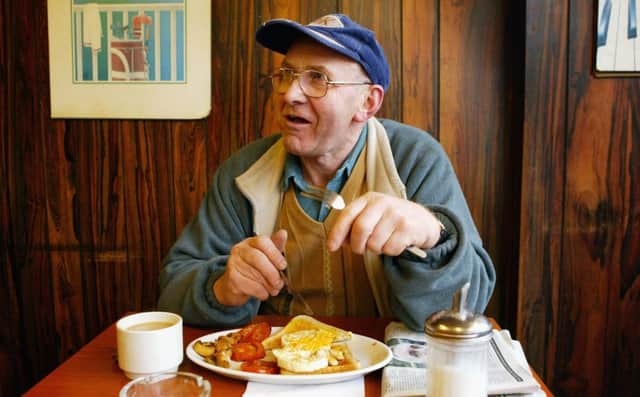Allan Massie: Lies, lies and NHS scare statistics


Who tell lies more often? Politicians? Journalists? Bankers? Lawyers? Fifa officials? All have been accused often enough of being at the very least “economical with the actualité”, as my old friend Alan Clark once remarked when caught fibbing.
And no doubt the charge is often justified. Sir Malcolm Bruce may have spoken a bit rashly when he said that all politicians lie sometimes. Nevertheless…
Advertisement
Hide AdAdvertisement
Hide AdPoliticians’ lies are, however, usually exposed fairly quickly. They lie for reasons of prudence or self-protection, mistakenly, because they are usually found out. But there are worse offenders, among them NHS officials and government health advisers. The saintly NHS comes near the top of the league among those who stray from the line of truth. Their favourite device is to present mere opinion as fact. They routinely threaten us with dreadful epidemics, and do so either to make themselves more important or to extract more money from the Treasury. What, by the way, happened to that “epidemic“ of new variant CJD (Creutzfeldt-Jakob disease), described as the “human form” of BSE, the disease that afflicted cattle? Experts warned that it would cut a swathe through hamburger-eaters, killing tens, if not hundreds, of thousands. The experts were wrong.


Now up steps Norman Stevens, chief executive of the NHS (England) to warn us against an obesity epidemic. He isn’t alone of course. Warnings about obesity come thick as falling leaves in autumn. I draw attention to Mr Stevens only because he has delivered a neat line. “Obesity,” he says, “is the new smoking.” And treating it threatens to overwhelm the NHS. Actually of course it’s only one of the things that do that, but the obesity epidemic is the fashionable fear.
There may be a lot of fat people about. That’s not news, though it is fairly new. Now that children in the poor quarters of our cities no longer suffer from rickets, they get fat instead. Bad thing, we are told. Strictly speaking, of course, there is no epidemic, because an epidemic is an outbreak of a contagious or infectious disease in a specific place or community. But let that pass.
Obesity is becoming more common. This is repeated so often that we may feel obliged to believe it. But is it true? In 2007 the Government Office for Science warned that “by 2015, 36 per cent of males and 28 per cent of females will be obese”. The most recent count gave the rates as 26 per cent and 24 per cent respectively. So while there may be too many fat people about, there are quite a lot fewer than we were told there would be.
Of course we all lap up health scares. Any newspaper editor knows this. Pretty well anything from coffee to tomatoes may, we are warned, give us cancer. It’s not so long since butter was health-threatening, though I forget why or in what way. Same went for eggs, of which I eat several most days. These dangers usually disappear pretty quickly, as soon indeed as they drop out of the headlines. Obesity – “the new smoking” – is for the moment a different and apparently more serious matter.
The obese, like smokers, impose a terrible cost on the NHS, and this is a cardinal sin these days. Only they don’t. Admittedly, treating them costs money. Treating anyone costs money. But the obese, like the smokers and, one might add, drinkers, tend to die younger than the slim, the non-smokers and non-drinkers. For the most part, they shuffle off this mortal coil a few years at most after collecting their pensions, and rarely occupy beds in geriatric wards, and, if they do so, it’s not often for long. It is for the most part the prudently health-conscious folk who survive to suffer dementia and the other distressing conditions of old age.
A wise man once said: “Why prolong life save to prolong pleasure?” (He killed himself when he found his arterio-sclerosis has become unendurable and was depriving him of pleasure in life, but that’s by the way.) It’s a good question, but not one as a society that we are willing to address, and it may indeed be proper that NHS professionals should turn away from it. Doctors are after all bound by the Hippocratic oath, and we wouldn’t like them to take a leaf out of Dr Harold Shipman’s prescriptions book.
Nevertheless there’s no need for them to practise dishonesty and to pretend that the greatest threats to the NHS are the financial burdens imposed on it by the obese, the smokers and drinkers. These are really the best friends the NHS has. They pay their taxes, get treatment which will usually last a comparatively short time, and then get out of the way. The heaviest costs on the NHS are imposed by the long-lived.
Advertisement
Hide AdAdvertisement
Hide AdIt’s longevity that threatens the future of the NHS. When it was created by Aneurin Bevan after the Second World War, average life expectancy was 68; it’s now 81 and is forecast to rise to 87 by 2030. This is the real problem for the Health Service, and, since – thank goodness – we are not going to put the old out in winter to die of exposure on Arthur’s Seat or Rannoch Moor, there’s nothing the NHS can do but bear the enormous cost of caring for them.
Fair enough, but it becomes intolerable when NHS officials inveigh against the obese, the smokers and drinkers, and pretend that it is treating them that threatens to bring the service to its knees. This is profoundly dishonest, for they are, I repeat, the best friends it has. “Eat, drink and be merry, for tomorrow you die” – tomorrow, not 20 years down the line when even the weight of the grasshopper has become a burden, as the author of Ecclesiastes wrote. Incidentally, Nye Bevan, always overweight, did his fair share of eating and drinking and, as I remember, smoking, and died in his early sixties, thus costing his NHS very little.